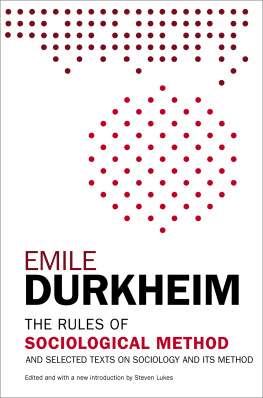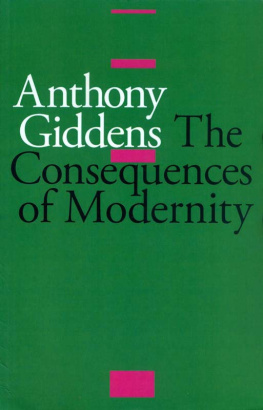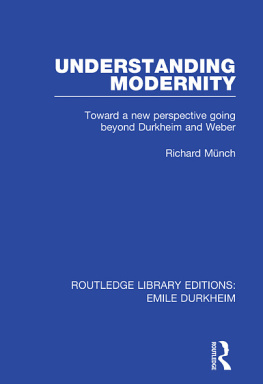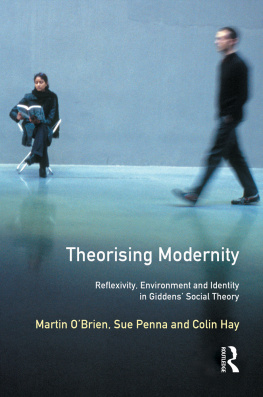ROUTLEDGE LIBRARY EDITIONS:
EMILE DURKHEIM
THE COMING FIN DE SICLE
THE COMING FIN DE SICLE
An application of Durkheim's sociology to
modernity and postmodernism
STJEPAN G. METROVI
Volume 3
First published in 1991
This edition first published in 2011
by Routledge
2 Park Square, Milton Park, Abingdon, Oxon, OX14 4RN
Simultaneously published in the USA and Canada
by Routledge
270 Madison Avenue, New York, NY 10016
Routledge is an imprint of the Taylor & Francis Group, an informa
business
1991 Stjepan G. Metrovi
All rights reserved. No part of this book may be reprinted or
reproduced or utilised in any form or by any electronic, mechanical, or
other means, now known or hereafter invented, including photocopying
and recording, or in any information storage or retrieval system,
without permission in writing from the publishers.
British Library Cataloguing in Publication Data
A catalogue record for this book is available from the British Library
ISBN 13: 978-0-415-58427-2 (Set)
eISBN 13: 978-0-203-83813-6 (Set)
ISBN 13: 978-0-415-56714-5 (Volume 3)
eISBN 13: 978-0-203-85826-4 (Volume 3)
Publisher's Note
The publisher has gone to great lengths to ensure the quality of this
reprint but points out that some imperfections in the original copies may
be apparent.
Disclaimer
The publisher has made every effort to trace copyright holders and
welcomes correspondence from those they have been unable to contact.
THE COMING FIN DE SICLE
This book attempts to show the relevance of Durkheim's sociology to the debate on modernity and postmodernism. It does so by examining how Durkheim's ideas can be applied to current social issues. The author argues that there are striking parallels between the social context of the 1890s, when Durkheim began to publish in book form, and today. Communism and socialism are in turmoil, as they were a century ago. Now, as then, stock markets are in constant danger of crashing. AIDS has become the new syphilis. Medjugorje has become the new Fatima, and the Virgin Mary is predicting terrible punishments for humanity again.
The book reexamines the fin de sicle spirit of the nineteenth century and applies the conclusions which emerge to the coming fin de sicle. It argues that the fruits of the Enlightenment are either dead or dying. It concludes that a new liberalism can be founded on Nietzsche's and Durkheim's cult of feeling, a benign irrationalism.
Timely and assured, the book will appeal to readers of sociology, as well as the related disciplines of philosophy, psychology, cultural studies and history. It is also intended for anyone interested in the issues and questions that will be raised as humanity approaches the coming end of the century and the end of the millennium.
THE COMING
FIN DE SICLE
An application of Durkheim's sociology
to modernity and postmodernism
STJEPAN G. METROVI
First published in 1991
by Routledge
11 New Fetter Lane, London EC4P 4EE
Simultaneously published in the USA and Canada by
Routledge
a division of Routledge, Chapman and Hall, Inc.
29 West 35th Street, New York, NY 10001
First published in paperback in 1992
1991 Stjepan G. Metrovi
Typeset by NWL Editorial Services
Printed and bound in Great Britain by
Biddies Ltd., Guildford and King's Lynn
All rights reserved. No part of this book may be reprinted or reproduced or utilized in any form or by any electronic, mechanical, or other means, now known or hereafter invented, including photocopying and recording, or in any information storage or retrieval system, without permission in writing from the publishers.
British Library Cataloguing in Publication Data
Metrovi, Stjepan G.
The Coming Fin de Sicle: Application of Durkheim's Sociology to
Modernity and Postmodernism. New edn
1. Sociology. Theories of Durkheim, mile, 18581917
I. Title
301
Library of Congress Cataloging in Publication Data
Metrovi, Stjepan Gabriel.
The Coming fin de sicle: an application of Durkheim's sociology to
modernity and postmodernism/Stjepan G. Metrovi.
p. cm.
Includes bibliographical references.
1. PostmodernismSocial aspects. 2. Durkheimian school of
sociology. 3. Rationalism. 4. Irrationalism (Philosophy)
I. Title.
HM73.M48 1990 908468
301.01-dc20 CIP
ISBN 0-415-08526-8
To David Riesman
CONTENTS
PREFACE AND
ACKNOWLEDGEMENTS
Nowadays, so many books and papers are being written about modernity and postmodernism that these terms have gained clich status. And their use has given rise to great confusion. Some authors understand postmodernism as an extension of modernity, while others see it as the antithesis of modernity. The interested reader may find it helpful for me to summarize in this preface how I compare with and differ from some other authors writing on these topics, and what is distinctive about the present book.
The gist of the argument presented in this book may be summarized as follows. The previous fin de sicle spirit and the current wave of postmodern culture share a common rhetoric of rebellion against the Enlightenment narrative. In this sense, the coming fin de sicle and the previous fin de sicle also seem to share cultural values and traits: a sense of anxiety, uneasiness, and excitement; a deliberate breaking away from the seriousness of tradition in favour of play, impulse, and fun; and a seemingly liberal concern with what might still be termed socialist, democratic, humanistic ideals of justice and equality. How many dictatorships have been toppled since the late 1970s and 1980s! No doubt these are among the many reasons that many authors today depict postmodern culture as a reaction against cold-hearted modernity.
But the present book will conclude that despite the apparent overlap between the fin de sicle spirit and the postmodern spirit, postmodernism is, in fact, an extension of modernity the very same bloodless Enlightenment modernity that the previous fin de sicle spirit rebelled against. Thus, the previous fin de sicle is depicted as a genuine reaction against Enlightenment narratives and a genuine search for the irrational bases of social order, primarily in the notion of human compassion. The coming fin de sicle will be understood as an imperfect, ambiguous, confused, and contradictory effort to replicate this genuine rebellion from the previous century. It will be argued that postmodern philosophy never truly rebels at the notion of rationality, never embraces compassion, and always maintains the commercialist, bourgeois status quo.
Thus, similarities and differences exist between the former and coming turns of the century. Perhaps important similarities are shared by all turns of the century this is something that is important to determine at some point, but will not be of any concern in the present book. Nor shall we be concerned with the questions of whether the









